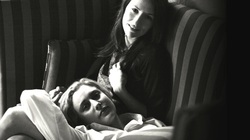Francis Ha

It is the perfect moment for Noah Baumbach, director and writer of the candidly bittersweet The Squid and The Whale (and whose scripts with Wes Anderson have been so clever and enchanting) to collaborate with actress and writer Greta Gerwig, a performer whose big-hearted persona has been waiting for just the right vehicle. Add to that more than a dash of French New Wave via a low-budget, black and white production, a backdrop of nouveau, hip, young Brooklyn, and you have Frances Ha, an indie classic that makes a star out of Gerwig. Like some of the best New Wave films of the ’60s, the movie brims with the giddy optimism of youth. Working seamlessly together, Gerwig and Baumbach catch the emotional rhythms and randomness of eager, creative, hopeful, young artists who are grappling to make sense of love and ambition, having to deal with the fact that entering the adult world means leaving illusions of indestructibility behind.
Frances, recently graduated from Vasser, is an apprentice with a modern dance company. As her dreams of dancing professionally are slowly compromised, she desperately hangs on to a deep friendship she has developed with her best friend Sophie (Mickey Sumner). But the relationship takes a challenging turn when Sophie gets engaged. Without her steadying comrade, Frances stumbles from situation to situation: she remains resolute, so her attempts to maintain balance are as endearing as they are erratic. This is a character that Gerwig plays masterfully, simultaneously registering intelligence and vulnerability. The script creates some wonderfully awkward moments for Frances: just as a scene appears to be headed towards the maudlin or the disastrous, the character delights us with her cheerful courage and self-effacement. When she doesn’t have enough money for a dinner (and has no credit card), Frances confesses to her date, “I’m not a real person yet.” She makes a long dash for a cash machine, stumbling on the way, returning to have the guy point out that she is bleeding. She glances at the wound. “Oh, shit. I can’t find it. I’m sorry.” “Don’t apologize to me, you’re the one who’s bleeding,” he responds. Eager to please and filled with unflappable good-intentions, she has a way of inducing perplexed silences. Greta Gerwig’s rare ability to evoke genuineness is due in part to the lessons learned in the films she made early in her career. After appearing in Joe Swanberg’s LOL (2006), Hannah Takes the Stairs (2007), and Nights and Weekends (2008), she has developed a uniquely charming screen presence. Her early films are built on Swanberg’s low tech approach to mundane realism (a film genre that has been labeled “mumblecorps”), which makes use of “rehearsed improvisation.” Gerwig’s performances in recent, more commercial films are infused with the same spontaneous spirit she created in those early films. Greenberg, the movie where she met Baumbach, is an obvious attempt to fashion a style similar to “mumblecorps,” though with more commercial appeal. The film revolves around Ben Stiller, playing the story’s intractable, middle-aged protagonist. Since then Gerwig has been cast in other roles where her quirky beauty and physicality are an advantage. But Frances Ha finally matches her distinctive comedic gifts with a great script. She is on screen every minute, often in close-up. The very last shot of the film is a star-making moment. In interviews, director Baumbach is clear that in Frances Ha he wants to catch the spirit of French New Wave films of the ’60s. He has been influenced by Jean-Luc Godard’s Band of Outsiders (Bande à part), as well as movies as diverse as Agnes Varda’s Cleo from 5 to 7, and Eric Rohmer’s romantic comedies. There’s also a stab at evoking the “big, grand, romantic, joyful music” of French composer Georges Delerue, whose scores include Truffaut’s Jules and Jim, Shoot the Piano Player, Godard’s Contempt, de Broca’s King of Hearts, and hundreds of others. These homages are at the service of capturing the young, progressive spirit that collided with the violent decade of Vietnam, assassinations, and social unrest. (A lot of popular music today reflects the same optimism. I’m thinking of artists such as The Head And The Heart, Of Monsters and Men, Fun, Florence and the Machine, and many others whose spirit serves as an antidote to our own era of violence and distrust.) At times, Baumbach’s film seems ready to break into song. When asked by friends to show off some of her dance moves, Frances does so unabashedly. These scenes recall indelible moments from ’60s French films, in particular the famous dance from Band of Outsiders. The most deliberate appropriation is David Bowie’s song “Modern Love,” which accompanies Frances as she bounds through New York City. It is a scene inspired by Leos Carax’s Mauvais sang. Baumbach said he wanted to reinvent the “perfection” of the earlier sequence in his film. Inevitably, the film will be compared to Lena Dunham’s series Girls. It even features Girls’ Adam Driver as Lev, a lothario who rents Frances a room in an apartment with his roommate Benji, a self-proclaimed scriptwriter, wonderfully played by Michael Zegen. Unlike the Dunham series, however, nobody sleeps around. In fact, nary a kiss is passed. The adorable relationship among these roommates is among the high points of the film. Benji continually reminds Frances that she is “un-datable” because of her too romantic tendencies. In one scene, he and Frances sit passively on a couch watching TV. Off screen we hear Lev asking a woman, “Want to see my room?” As he passes through the frame, he casually says to them, “Hi guys, this is Lindsay.” They barely move their heads to watch the two pass by and, after a moment Frances says, “I wish I had cookies.” Long pause. “Chessmen.” Despite suffering through adversity and uncertainty, Frances is one of the most hopeful characters I’ve seen on film in a long time. Time for full disclosure: I have a 26-year-old daughter who is a dancer, and she is moving to Brooklyn. Granted, the young adults in Frances Ha are college-educated and come from a comfortable economic strata. At one point, Beji observes, “You’re not poor.” Frances replies, “Yes, I am.” He shoots back, “That’s an insult to real poor people.” Nevertheless, I see in this up-and-coming generation a stubborn honesty and romantic faith that is reassuring. It is this quality of resilience that Frances Ha captures so beautifully: it is a film that will leave you feeling a little more optimistic about the future. |

